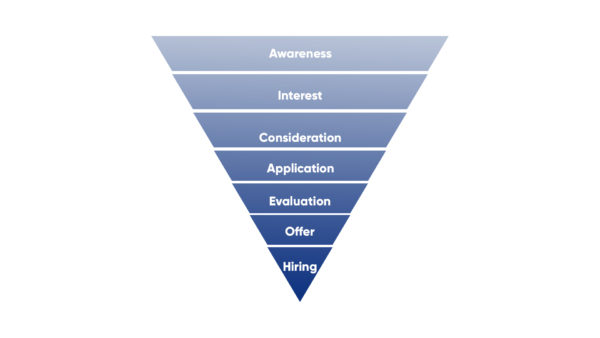What is a Recruiting Funnel?
The recruiting funnel is a structured approach used by organizations to attract, engage, and hire top talent. Similar to a sales funnel, it represents the stages a candidate goes through from initial contact with a company to becoming a new hire.
The 7 Stages of the Recruiting Funnel

1. Awareness:
At the top of the funnel, candidates become aware of a company’s existence and its job openings. This stage involves employer branding, content marketing, and utilizing various platforms to increase visibility.
2. Interest:
Candidates who are aware of the company start showing interest. This stage focuses on engaging them through compelling content, career fairs, social media, and networking events.
3. Consideration:
Prospective candidates start evaluating the company and its opportunities. Employers provide more detailed information about the company culture, benefits, and growth prospects to nurture their interest.
4. Application:
This stage involves candidates applying for open positions. Companies streamline the application process to make it user-friendly and gather relevant information about the applicants.
5. Evaluation:
Recruiters review applications, conduct interviews, and assess candidates’ skills, experience, and cultural fit. This stage involves multiple interactions between the company and the candidates.
6. Offer:
After the evaluation stage, a company extends a job offer to the most suitable candidate. This offer includes details about the position, salary, benefits, and other pertinent information.
7. Hiring:
The final stage involves the candidate accepting the offer and officially joining the company. Onboarding processes begin to integrate the new hire into the company culture and operations.
Importance of a Well-Defined Recruiting Funnel
A well-structured recruiting funnel streamlines the hiring process, enhances candidate experience, and ensures that the company attracts the best talent efficiently. It allows for the identification of potential bottlenecks and areas for improvement in the recruitment process.
By optimizing each stage of the funnel, companies can attract a diverse pool of candidates, reduce time-to-hire, and improve the quality of new hires. Additionally, a positive candidate experience can enhance the company’s employer brand, attracting more top-tier talent in the long run.
In conclusion, understanding and effectively managing the recruiting funnel is pivotal for organizations to acquire the right talent and build a strong, capable workforce.
